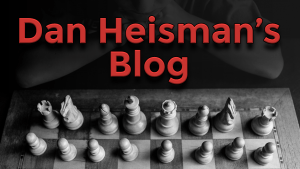
Q&A with Coach Heisman Oct 3, 2014
"If you had a choice of seeing the future or reading your opponent's mind as they apply to a chess game, which one would you do?"
I never had that question before!
If I could see the future (not with regards to the game), there are some options in the stock market I would like to chain together...But back to your question.
The problem with reading my opponent's mind is that it does not prevent many types of errors.
For example, suppose I am playing a GM and it is his move and I could hear what he is thinking. Suppose he evaluates the position as equal and, after a search, finds his best positional move, noting that this is the right idea for the position and his move is safe (it cannot be defeated by any reply I would have of a check, capture, or threat he cannot meet next move). So he makes that move.
At this point the main thing I know is that, in my opponent's opinion, I don't have a winning tactic. Now a GM is not a computer and he might be wrong, so to not look for such a tactic would be derelict to my analytical duties of the move. However, the chances for success would certainly be diminished if I knew my strong opponent felt there was nothing there to find.
However, it doesn't tell me which of my moves are safe (and currently, on my move, the GM is trying to figure out which of my moves are not safe, so continuing to read his mind is not as helpful). So unless I were a very strong player, too, each move there would be a likelihood that I would make an unsafe move and just lose on the spot. Having read my opponent's mind therefore was not all that helpful in avoiding making unsafe moves (tactical blunders).
However, if I could see the future that's a different story. There's just one catch: seeing the future would only help in one of the two possible "science fiction: scenarios:
A) There is only one future and you are doomed to live it, or
B) There are many possible futures and when you do something different from the future you foresaw, you create a "new" future
In order to benefit from seeing the future, you have to believe in "B", the "alternate timeline" hypothesis. Because if "B" is not possible and "A" is true, then being able to see the future is worthless because if you see that you lost because your 15th move was a terrible mistake, your hand is going to reach out anyway and make that move, and that would be horrible knowing that is going to happen! So for the sake of argument, we are going to assume the "alternate timeline" possibility, B.
Ah, but now we're cookin'! If I want a draw, all I have to do is avoid all the futures where my moves lose. If I want a win, I have to avoid all the futures where my moves don't win - this may take a lot "longer" if I am not a very strong player and my opponent is a GM! In any case, seeing a bad future and having the ability to avoid it is a pretty strong skill. Maybe there is a movie in there somewhere...
"What is your budget for books?"
This question was asked in response to a book question where I turned around and pulled out a few books (Pump Up Your Rating by Axel Smith, the new 3rd edition of Winning Chess Puzzle for Kids [and NOT just for Kids!] by Jeff Coakley, Bologan's Black Weapons by GM Bologan, and Opening for Amateurs by Pete Tamburro, all recommended for various levels).
The good news is that I make my living teaching chess (mostly to adults over the internet, like thru Skype and Chess.com Live, but several of my students are "live" and others are juniors), so it's a legitimate tax deduction when I do chess stuff, like buy books. So I don't feel so bad when I spend some money on chess books.
In addition, I have written books for several active publishers (Everyman, Mongoose Press, Russell Enterprises, Thinker's Press) so those publishers occasionally send me some of their new publications to review. So does New in Chess publications, so the main chess book publisher who does not have me on their "list" is Gambit. Don't get me wrong; I don't get all the books published by these publishers for review. They send me a select few. But it certainly does save on my book budget and allow me to review more books - and recommend them to readers like yourself - than I normally would be able to do.
"Does the advent of computer analysis allow GMs to play weird openings?"
This is an interesting question and my first thought was to say "Yes and No". Yes, because if a rare line is showed playable by the computer, a GM is much more likely to play it today, confident that there are no hidden traps his opponent might know. No, because of the definition of weird openings. If by weird you mean 1.c3 or 1.e4 a5, then no, those are not being played. But if by "weird" you mean sidelines of "regular" openings that were not being played much before, then yes.
I think we could split up the feeling about using computers to investigate GM openings into two extreme camps:
1) Do the normal investigation of future opponent GM's openings and try to find an improvement on move N (likely move 12 or further) that can likely be used against him in an upcoming encounter, and
2) Use the computer to investigate rarely played lines that might just be reasonable, and would take the oppnent out of the book, at the very least putting the GM on equal terms out of the opening.
I think Magnus Carlsen is more a proponent of idea 2 than idea 1. Carlsen often plays sidelines that are not the hottest areas of debate, with the goal of getting a playable game early and avoiding any opening preparation by the opponent that might lead to a computer-backed surprise.
So in that sense we are seeing GMs being a little more bold in selecting lines that may not be the latest and greatest battlegrounds for opening theory (although are still common and, in many cases, fun) armed with the "security blanket" of computer verification that these rare lines are perfectly playable.
"When is it justified to play h3 or h6 in the opening?"
This is a tricky question. One guideline I give is that it is rarely correct to play h2-h3 to prevent a bishop pin with Bc8-Bg4 unless that is the bishop's only good move. But this is a weak principle with many exceptions, such as the Main Line of the Closed Ruy Lopez:
But White (or Black) often plays h2-h3 or even f2-f3 to prevent Nf6-Ng4 in lines where White wants to play Bc1-e3, such as the Classical Pirc, Yugoslav Attack in the Sicilian Dragon, or Saemisch Variation of the King's Indian.
For more on this common question, check out my Novice Nook A Guide to P-R3. I am sure I don't have to tell readers that Novice Nook is a misnomer - my long-running column is meant to help anyone at any level learn how to play chess better.
Q&A with Coach Heisman is now scheduled on Chess.com TV the first Friday every month, from 5-6::30 PM ET.






